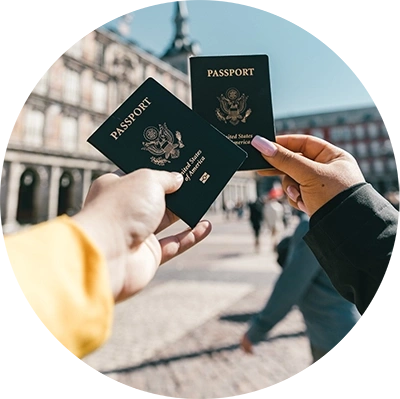Employment-Based Immigration Second Preference (EB-2)
EB-2 visas, ranking as the second most common category within the employment-based immigrant visa spectrum, offer a significant pathway for professionals aiming for permanent residency in the United States. Achieving an EB-2 visa status is notably challenging, typically necessitating a U.S. employer’s sponsorship, a certified labor certification (PERM), and meeting a comprehensive list of prerequisites. Despite these challenges, the effort is well rewarded, providing a direct route to permanent residence status.
EB-2 visas are granted to two categories of applicants as follows:
- Professionals who hold an advanced degree (or its equivalent), underlining the EB2 advanced degree
- Individuals demonstrating exceptional ability in the sciences, arts, business, medicine, or athletics, capable of significantly benefiting the national economy, cultural landscape, or educational interests of the United States, aligning with the National Interest Waiver (NIW)
At Passage Immigration Law, our experienced visa attorneys specialize in the EB-2 visa process, including the nuanced EB2 NIW process and EB2 advanced degree pathways. We are committed to assisting clients in navigating the application complexities, ensuring a successful outcome. For those exploring their eligibility or curious about the EB2 NIW vs EB2 distinctions and benefits of EB2 NIW, consulting with an immigration lawyer is a crucial step. Contact us at (503) 427-8243 to start your consultation, or visit our website to learn more about how we can support your journey towards securing an EB-2 visa.
Eligibility for an EB-2 Visa
Professionals with advanced degrees and individuals demonstrating exceptional ability stand as two primary categories eligible for EB-2 status, alongside those potentially qualifying for a National Interest Waiver (NIW).
Professionals with Advanced Degrees
If you possess an advanced degree, such as a master’s degree or higher, complemented by a job offer from a U.S. employer, you might be on your path to permanent residency under this EB-2 category. The role you’re being considered for must explicitly demand an advanced degree or its equivalent as the minimum educational requirement. Merely holding such a degree isn’t enough if the job is open to candidates with lower qualifications.

For degrees earned abroad, securing an independent credential evaluation is essential to confirm that your education aligns with the U.S. standards for a master’s degree or higher. Additionally, if your highest academic achievement is a bachelor’s degree, but you have amassed at least five years of progressive, post-degree work experience in a field closely related to the one you are applying for, you might still fit the eligibility criteria for this EB-2 category. This “progressive” experience should demonstrate a trajectory of increasing responsibility and depth of knowledge in your area of expertise over the period.
The application journey begins with your employer securing a labor certification (“PERM”) from the U.S. Department of Labor, followed by the submission of a Form I-140 to USCIS on your behalf. It’s important to note that self-petitions are reserved exclusively for candidates eligible for a National Interest Waiver (NIW), which allows for a more flexible pathway to EB2 permanent residency without the need for a specific job offer or employer sponsorship.
Persons of Exceptional Ability
Qualifying for an EB-2 visa under the exceptional ability category is possible even without an advanced degree or the combination of a bachelor’s degree and five years of progressive work experience. In this context, exceptional ability refers to a level of expertise significantly surpassing what is commonly found in the field. This can be proven by satisfying at least three regulatory criteria, such as possessing relevant diplomas or certificates, ten years of full-time related experience, a professional practice license, proof of earning a higher salary indicative of exceptional ability, memberships in professional bodies, or acknowledgement of your contributions by peers. Acceptance of other equivalent forms of evidence further broadens the avenues to demonstrate such exceptional ability.
This EB-2 pathway is particularly advantageous for individuals rich in professional experience yet lacking formal higher education credentials or for those who, possess a bachelor’s degree, and have notable achievements but have not accumulated five years of progressive experience post-college. The necessity of obtaining a labor certification and having your employer file a Form I-140 petition remains. However, the opportunity for self-petitioning is exclusively available to those who meet the criteria for a National Interest Waiver (NIW), offering a streamlined route to EB-2 visa eligibility for highly skilled professionals without the conventional requirements.
National Interest Waiver
Although all EB-2 categories require that a U.S. employer first obtains a labor certification and then files a Form I-140 immigrant visa petition on your behalf, you may be exempt from such requirements if granting you a visa would be in the “national interest” of the U.S.
To be eligible for this waiver, you must first be a professional holding an advanced degree or its equivalent or have “exceptional ability” as defined by the regulations.
You must then pass a three-prong test by showing that:
- Your proposed endeavour has both substantial merit and national importance.
- You are well-positioned to advance the proposed endeavour.
- On balance, it would be beneficial to the U.S. to waive the requirement of a job offer.
Your proposed endeavour can be in a variety of fields, including business, science, health, technology, culture, or education. If you qualify under NIW exemption, you may self-petition a Form I-140 with the USCIS without a job offer from a U.S. employer, and you are also exempt from having to receive a labor certification from the U.S. Department of Labor. The NIW can also be very useful for self-employed entrepreneurs whose products or services can benefit the U.S. economy and people.
EB-2 Visa Process
The EB-2 visa process typically mandates the submission of a PERM Labor Certificate, certified by the Department of Labor. Nonetheless, the National Interest Waiver (NIW) offers a notable exception, removing the need for labor certification for individuals whose visa grants serve the U.S. national interest significantly. This waiver primarily benefits those with exceptional ability, ensuring their employment significantly benefits the United States.
For those opting for the NIW path, the usual requirement for employer sponsorship is waived, allowing applicants to self-petition and directly submit a Form I-140 to USCIS.
Conversely, if not pursuing a NIW, you’ll need your employer’s sponsorship. Here, your employer is tasked with filing both a labor certification and a Form I-140, affirming that your employment will not adversely impact the U.S. labor market and that your role is essential, with no local counterpart available. During the green card application process, the applicant’s family is eligible to accompany them, securing work authorization upon the principal applicant’s green card acquisition.
Whether navigating the application independently or through employer sponsorship, consulting with our skilled immigration lawyer specializing in EB-2 visas is crucial to confirm all prerequisites are met and to streamline your application process.
How Can an Experienced EB-2 Attorney Help?
Navigating the EB-2 visa application can be a complex journey, requiring meticulous attention to detail—from compiling the necessary documentation to adequately preparing for the interview and systematically organizing the final submission. At Passage Immigration Law, we are committed to the exclusive practice of immigration law, ensuring our clients receive the focused expertise needed to advance their immigration goals successfully.
Our team of EB-2 visa attorneys brings a wealth of experience in guiding clients through the intricacies of the immigration system. With offices strategically located in Portland, Oregon; Los Angeles, California; and Seattle, Washington, we are well-positioned to serve clients across the nation, ensuring your petition is filed effectively and efficiently.
For personalized assistance and to start your journey towards achieving your EB-2 visa, reach out to us at (503) 427-8243, or secure your consultation through our website. Our dedicated attorneys are here to collaborate with you every step of the way, making your goal of living and working in the U.S. a reality.

